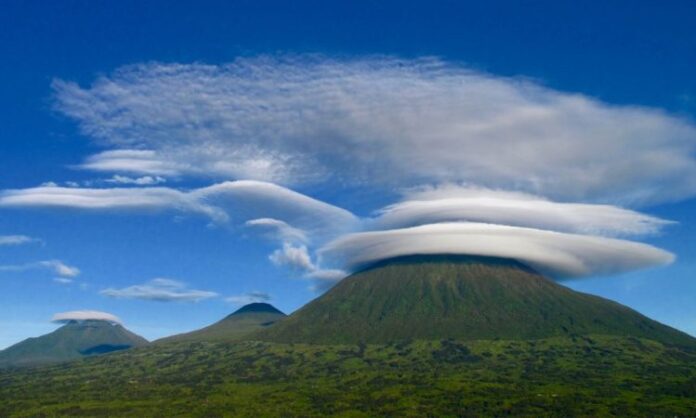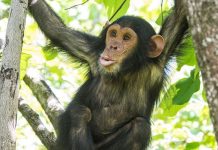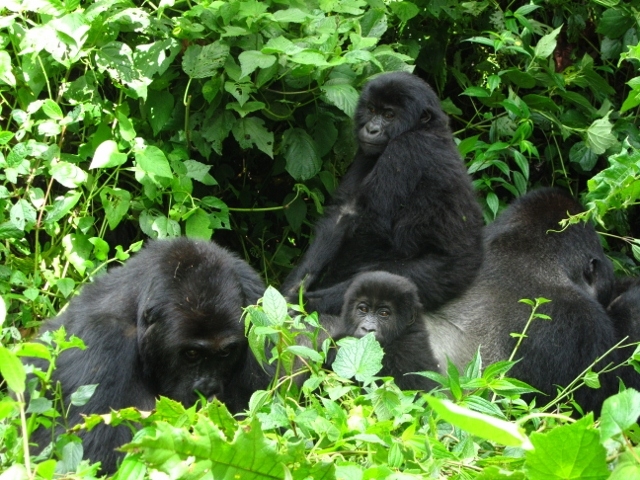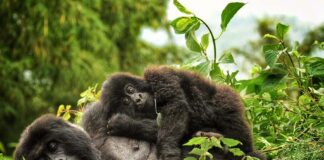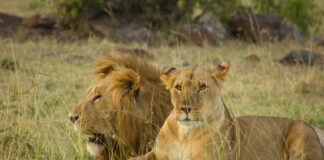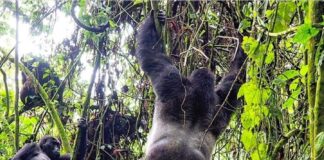Mount Karisimbi is a stratovolcano in the Virunga Mountains on the border between Rwanda and the Democratic Republic of Congo. Found in Rwanda’s prestigious Volcanoes National Park, Mount Karisimbi is currently dormant. At 4,507 meters (14,787 ft), Karisimbi is the highest of the eight major mountains of the mountain range, which is a part of Albertine Rift, the western branch of the East African Rift. Karisimbi is flanked by Mikeno to the north, Bisoke to the east and Nyiragongo to the west, on the other side of the Rift Valley. Karisimbi is the 11th highest mountain of Africa.
This inactive volcano is found in the Volcanoes National Park (known for inhabiting the endangered mountain gorillas). The mountain derived its name Karisimbi (Kinyarwanda for “White Shell”) from the snow that usually covers the top during the dry season. Karisimbi has a caldera Branca and two craters at the summit with the largest being Mutango.
Annual tourists to Volcanoes National Park always prefer to combine gorilla trekking experience with a 2-day Karisimbi mountain hike. Climbing Mount Karisimbi is of course strenuous but a very special and memorable experience. Being nestled within the Volcanoes National Park, hikers should always expect to come across mountain gorillas, several bird species, golden monkeys, and passing by the grave of Dian Fossey – the famous researcher on Mountain gorillas in Rwanda.
The trail and path towards the top of Mount Karisimbi comprises of great physical features/landscape, volcanic features, dense forest and vegetation which are beautiful to behold. However the hike may involve navigating through thick jungle, steep slopes and muddy trails in the rainy season. The best time for hiking Mount Karisimbi is therefore during the drier months of January to March and then June to October. Meanwhile, it can be hiked all-year-round.
Being a strenuous activity, to hike Mount Karisimbi, a hiker is advised to first ensure himself/herself that he/she is in the better position to face this challenging yet memorable activity. If you are feeling any ill or having any sickness you are advised not to go for the hiking of Mount Karisimbi. You also need to prepare mentally for the high altitude conditions which can be distressing hence slowing you down. However, porters are always available for hire at a very lower price of not more than US$ 20; porters will do for you a very tremendous job of carrying your back pack hence enabling you to hike without any difficulty – when you’re not heavy loaded with the back pack.
A hike to the summits of Mount Karisimbi and descending back is always completed in two days. Hikes to this beautiful mountain usually start very early in the morning; at 7:00 am. Hikers need to first go to the park headquarters to register and get briefing from the park warden and guides. After the briefing, hikers are driven to the starting point at the foot of Mount Bisoke.
Hiking to the top may take like 6 to 7 hours but hikers need to stop midway at an altitude of 3,700 meters for the night. A camp is set where dinner is prepared as everyone takes a rest while preparing for the final climb the next day. After enduring the cold night and taking early morning breakfast, hikers should be fresh and ready to start hiking to the summit which takes an hour.
The trail from the camp to the summit is steeper and more difficult to navigate as the mud gets thicker, winds stronger and fog reduces visibility. Once on top of the volcano, the scenery is spectacular and beautiful to behold. Atop Mount Karisimbi, hikers are ensured of stunning views of the Muhabura volcano, the Nyamulagira volcano, the Nyiragongo, the vast and great forests and vegetation within the Virunga ranges and the Congolese border. After getting enough of the spectacular views, hikers will then descend back to the starting point for your next destination – this can take less than 6 hours.
